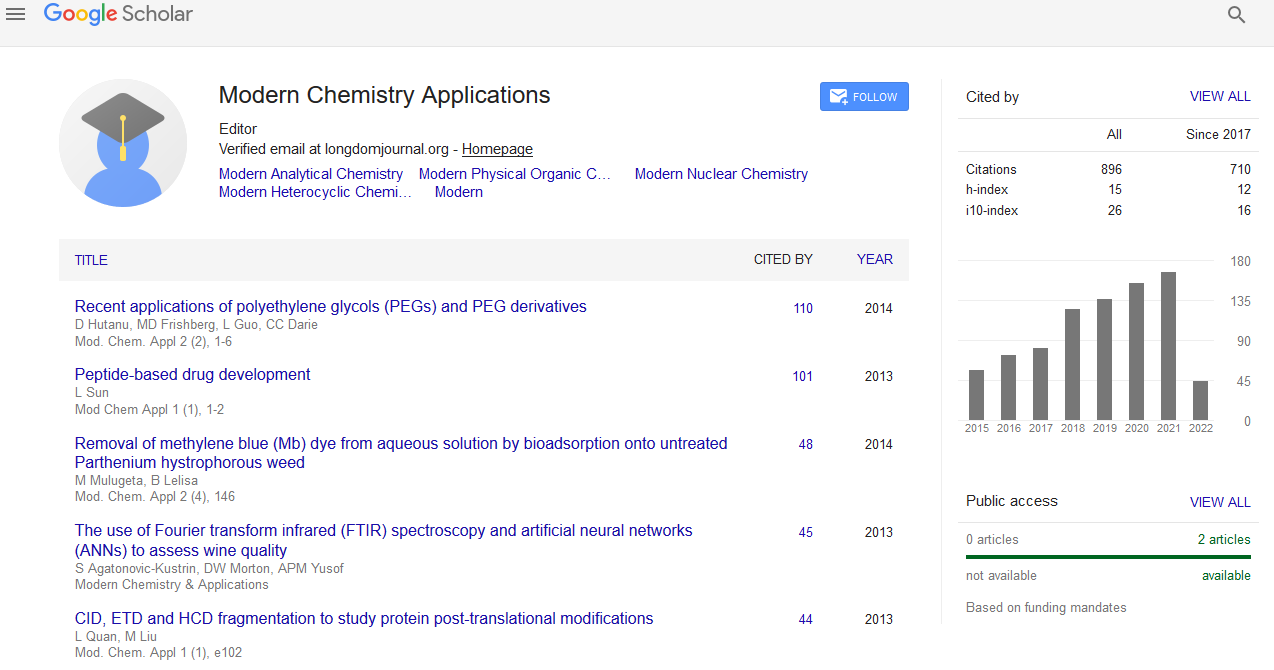Indexed In
- Open J Gate
- JournalTOCs
- RefSeek
- Hamdard University
- EBSCO A-Z
- OCLC- WorldCat
- Scholarsteer
- Publons
- Geneva Foundation for Medical Education and Research
- Google Scholar
Useful Links
Share This Page
Journal Flyer

Open Access Journals
- Agri and Aquaculture
- Biochemistry
- Bioinformatics & Systems Biology
- Business & Management
- Chemistry
- Clinical Sciences
- Engineering
- Food & Nutrition
- General Science
- Genetics & Molecular Biology
- Immunology & Microbiology
- Medical Sciences
- Neuroscience & Psychology
- Nursing & Health Care
- Pharmaceutical Sciences
Perspective - (2021) Volume 9, Issue 8
Perspective on the Waste Product Which Could Help Mitigate Climate Change
Sathvik Arava*Received: 16-Aug-2021 Published: 30-Sep-2021, DOI: 10.35248/2329-6798.21.9.318
Perspective
Biochar can boost crop yields in poor soils and help stop the effects of climate change, study finds an item produced using metropolitan, agribusiness and ranger service squander has the additional advantage of lessening the carbon impression of current cultivating, a global survey including UNSW has found. Visiting Professor in the School of Materials Science and Engineering at UNSW Science, Stephen Joseph, says the investigation distributed in GCB Bioenergy gives solid proof that biochar can add to environmental change relief. "Biochar can draw down carbon from the air into the dirt and store it for hundreds to millennia," the lead creator says. "This concentrate likewise found that biochar helps fabricate natural carbon in soil by up to 20 percent (normal 3.8 percent) and can decrease nitrous oxide emanations from soil by 12 to 50 percent, which expands the environmental change moderation advantages of biochar." The discoveries are upheld by the Intergovernmental Panel on Climate Change's new Special Report on Climate Change and Land, which assessed there was significant environmental change moderation potential accessible through biochar. "The intergovernmental board found that worldwide, biochar could alleviate between 300 million to 660 million tons of carbon dioxide each year by 2050, " Prof. Joseph says. "Contrast that with Australia's outflows last year - an expected 499 million tons of carbon dioxide - and you can see that biochar can ingest a great deal of discharges. We simply need a will to create and utilize it."
Biochar is the result of warming biomass build-ups, for example, wood chips, creature excrements, slops, fertilizer and green waste, in an oxygen-starved climate - an interaction called pyrolysis. The outcome is steady charcoal which can cut nursery emanations, while boosting soil richness. The GCB Bioenergy study surveyed around 300 papers including 33 meta-examinations that analyzed a large number of the 14,000 biochar considers that have been distributed throughout the most recent 20 years. "It discovered normal harvest yields expanded from 10 to 42 percent, centralizations of hefty metals in plant tissue were diminished by 17 to 39 percent and phosphorus accessibility to plants expanded as well," Prof. Joseph says. "Biochar assists plants with opposing ecological anxieties, like illnesses, and assists plants with enduring poisonous metals, water pressure and natural mixtures like the herbicide atrazine." The examination subtleties interestingly how biochar further develop the root zone of a plant. In the initial three weeks, as biochar responds with the dirt it can animate seed germination and seedling development. During the following a half year, receptive surfaces are made on biochar particles, working on supplement supply to plants. Following three to a half year, biochar begins to 'age' in the dirt and structures micro-aggregates that shield natural matter from deterioration.
Prof. Joseph says the investigation tracked down the best reactions to biochar was in acidic and sandy soils where biochar had been applied along with compost. "We tracked down the constructive outcomes of biochar were portion subordinate and furthermore reliant upon coordinating with the properties of the biochar to soil imperatives and plant supplement prerequisites," Prof. Joseph says. "Plants, especially in low-supplement, acidic soils normal in the jungles and damp subtropics, like the north shoreline of NSW and Queensland, could altogether profit from biochar. "Sandy soils in Western Australia, Victoria and South Australia, especially in dryland districts progressively influenced by dry spell under environmental change, would likewise incredibly benefit."
Prof. Joseph AM is a specialist in creating designed stable biochar from agribusiness, metropolitan and ranger service deposits. He has been exploring the advantages of biochar in advancing sound soils and addressing environmental change since he was acquainted with it by Indigenous Australians in the seventies. He says biochar has been utilized for creation of harvests and for keeping up with sound soils by Indigenous people groups in Australia, Latin America (particularly in the Amazon bowl) and Africa for a long time. Biochar has likewise been recorded in the seventeenth Century as a feed supplement for creatures. Yet, while Australian analysts have contemplated biochar since 2005, it has been somewhat delayed to take off as a business item, with Australia delivering around 5000 tons every year. "This is partially because of the modest number of enormous scope exhibition programs that have been subsidized, just as ranchers' and government guides' absence of information about biochar, administrative obstacles, and absence of investment and youthful business people to support and fabricate biochar organizations," Prof. Joseph says.
In correlation, the US is delivering around 50,000 tons every year, while China is creating in excess of 500,000 tons per year. Prof. Joseph, who has gotten an Order of Australia for his work in sustainable power and biochar, says to empower boundless reception of biochar, it should be promptly coordinated with cultivating activities and be exhibited to be financially reasonable. "We've done the science, what we don't have is sufficient assets to teach and prepare individuals, to set up exhibitions so ranchers can see the advantages of utilizing biochar, to foster this new industry," he says. Anyway this is gradually changing as huge partnerships are buying carbon dioxide decrease declarations (Corc's) to counterbalance their emanations, which is boosting the profile of biochar in Australia. Biochar has potential in a scope of utilizations. Prof. Joseph co-composed a new report in International Materials Reviews which nitty gritty the less notable employments of biochar, like a development material, to decrease poisons in soil, develop microorganisms, in creature feed and soil remediation. UNSW has a community oriented award with an organization and a college in Norway to create a biochar based enemy of microbial covering to kill microorganisms in water and discover use in air filtration frameworks, he says. Stephen Joseph is an individual from the Australian New Zealand Biochar Industries Group. The Universities where he works have gotten awards from both state and central governments and from organizations for the turn of events and testing of biochars. He has additionally helped organizations and ranchers foster fit for reason biochars and hardware to make biochar.
Citation: Sathvik A (2021) Perspective on the Waste Product Which Could Help Mitigate Climate Change. J Mod Chem App 9: 318.
Copyright: © 2021 Sathvik A. This is an open-access article distributed under the terms of the Creative Commons Attribution License, which permits unrestricted use, distribution, and reproduction in any medium, provided the original author and source are credited.


